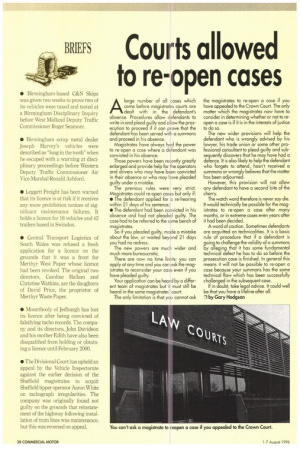Courts allowed to re-open cases
Page 40

If you've noticed an error in this article please click here to report it so we can fix it.
Alarge number of all cases which come before magistrates courts are dealt with in the defendant's absence. Procedures allow defendants to write in and plead guilty and allow the prosecution to proceed if it can prove that the defendant has been served with a summons and proceed in his absence.
Magistrates have always had the power to re-open a case where a defendant was convicted in his absence.
Those powers have been recently greatly enlarged and provide help for the operators and drivers who may have been convicted in their absence or who may have pleaded guilty under a mistake.
The previous rules were very strict. Magistrates could re-open cases but only if:
• The defendant applied for a re-hearing within 21 days of his sentence; • The defendant had been convicted in his absence and had not pleaded guilty. The case had to be referred to the same bench of magistrates. So if you pleaded guilty, made a mistake about the law, or waited beyond 21 days you had no redress. The new powers are much wider and much more bureaucratic.
There are now no time limits: you can apply at any time and you can ask the magistrates to reconsider your case even if you have pleaded guilty. Your application can be heard by a different team of magistrates but it must still be heard in the same magistrates' court. The only limitation is that you cannot ask the magistrates to re-open a case if you have appealed to the Crown Court. The only matter which the magistrates now have to consider in determining whether or not to reopen a case is if it is in the interests of justice to do so.
The new wider provisions will help the defendant who is wrongly advised by his lawyer, his trade union or some other professional consultant to plead guilty and subsequently discovers that he may have had a defence. it is also likely to help the defendant who forgets to attend, hasn't received a summons or wrongly believes that the matter has been adjourned. However, this provision will not allow any defendant to have a second bite of the cherry. The watch word therefore is never say die. It would technically be possible for the magistrates to re-open a case after many months, or in extreme cases even years after it had been decided.
A word of caution. Sometimes defendants are acquitted on technicalities. It is a basic rule of procedure that if a defendant is going. to challenge the validity of a summons by alleging that it has some fundamental technical defect he has to do so before the prosecution case is finished. In general this means it will not be possible to re-open a case because your summons has the same technical Flaw which has been successfully challenged in the subsequent case.
If in doubt, take legal advice. It could well be that you have a lifeline after all.
by Gary Hodgson




































































































